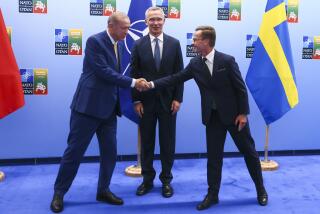‘We Want This Deal,’ Briton Says of Arms Pact
- Share via
British Defense Secretary George Younger said Wednesday there is “a very strong consensus” in Europe for Senate ratification of a U.S.-Soviet treaty banning medium- and short-range nuclear missiles.
Aware that it might be difficult to obtain the two-thirds majority required for ratification, Younger said that defeat of the treaty “would be a serious setback” for Washington and its European allies. Importantly, he added, “the Soviet Union would be tempted not to make reductions” in its nuclear arsenal in the future should the treaty be rejected by the Senate.
For these reasons, Younger told a news conference, there is “a very strong consensus in Great Britain and throughout Europe that we want this deal.”
Younger, who arrived from three days of talks in Monterey with NATO defense ministers on nuclear weapons policy, spoke with reporters at the Hancock Park residence of the British consul-general.
The treaty, which White House officials have said is almost completely hammered out, is expected to be signed next month by President Reagan and Soviet leader Mikhail S. Gorbachev at a Washington summit.
Earlier Wednesday, the North Atlantic Treaty Organization ministers called for quick Senate ratification of the treaty. At the same time, the NATO secretary general, Britain’s Lord Carrington, and U.S. Defense Secretary Caspar W. Weinberger said that the alliance’s military leaders agreed unanimously to maintain an effective nuclear deterrent to a possible Soviet attack.
Carrington and Younger said in Monterey that the NATO countries are satisfied with assurances by Reagan and Weinberger that the proposed treaty does not signal a retreat from the U.S. commitment to Europe.
Younger said that former Secretary of State Alexander M. Haig Jr. was flatly wrong when he said last week that European support for the treaty resulted from “arm-twisting” by the Reagan Administration. Actually, Younger said, there was “relief and satisfaction” among European leaders when the summit was announced.
More to Read
Sign up for Essential California
The most important California stories and recommendations in your inbox every morning.
You may occasionally receive promotional content from the Los Angeles Times.













